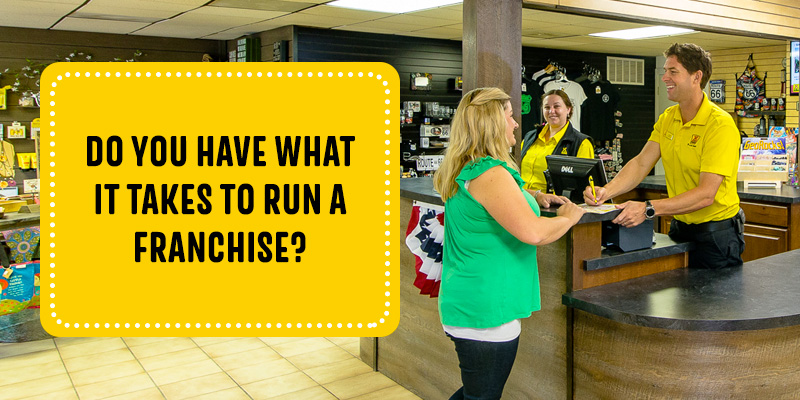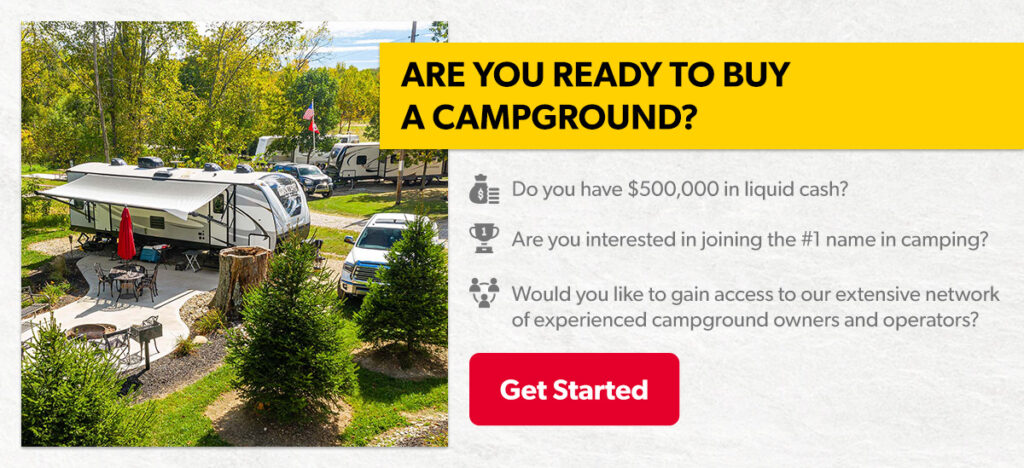
Franchising lets you manage a business venture with less risk. You can use an established brand to break into a market more easily. Certain traits and knowledge can help your franchise have more long-term success.
Learn more about what you need for a successful franchise and how Kampgrounds of America, Inc. can help.
What Is Franchising?
A franchise is a business that provides products and services under specific branding and operational rules set by a parent corporation. An individual or group pays initial royalties and fees for the right to operate under the brand and business model. Franchises help major businesses expand their geographical reach and market success — the more franchised stores are available, the more you can increase brand awareness.
Franchising affords many benefits to business owners. Starting a franchise allows entrepreneurs to enter competitive markets with an established brand name and resources. Customers are already familiar with your store’s services and brand reputation, increasing initial traffic numbers. Instead of using resources to explain your brand, you can rely on existing testimonials and knowledge to build your brand presence.
What Are the Qualities You Need to Own a Franchise?
Running a franchise requires financial and personal dedication. Franchisees must manage upfront costs, market fluctuations and other responsibilities.
To be a successful franchise owner, you need strong leadership and communication skills. These traits can help you navigate the market effectively:
- Adaptability: Adaptability is a vital trait for success in any business. Changing customer demands and market trends cause franchises to change their operational approaches constantly. Anything from supply chain constraints to customer reactions can change your regular routines. Franchisees must adapt to these changes and find the best way to move forward instead of letting disruptions affect business operations.
- Patience: New franchise owners must trust the process and follow all corporate and brand guidelines in the first operational stages. Stay faithful to your goal even if you do not see immediate results. Franchisees with realistic expectations of initial success might show more persistence later.
- Passion: A genuine passion for business or your chosen franchise also helps with success. Hard work and dedication help you reach goals — without a drive for success, you might find it harder to break into the market. Many franchisees choose services or products they feel passionate about to make the process more enjoyable. For instance, some people might get excited about serving food to customers, while others prefer delivering particular services. Running a franchise becomes more satisfying and fulfilling if you love your brand.
How to Buy a Franchise
Learning about the franchise process can also help you decide whether you have the drive to operate one. You can evaluate your financial and interpersonal ability to complete the process.
These are the basic steps of starting a franchise:
1. Research Potential Franchises

The first step of opening a franchise is finding the best fit for you. You should conduct thorough research when choosing a brand. You might already have a franchise or industry type in mind, making the selection process easier.
Some franchises might be easier to open than others. As you narrow down options, research details like:
- Current market success: Parent corporations that already see success in similar areas are often more likely to be successful in your region. Popular brands have loyal customer bases that can engage with your location right when you open. In addition, the more positive things people hear about your brand, the more likely they will seek out your services after you open a new store.
- Number of competitors: The local business landscape impacts your franchise’s success. If you find a desired brand, consider potential competitors in your region that could detract from business success. For example, stores that offer similar food options might increase the risk of a new fast-food franchise. If you commit to a particular franchise but think your environment has too much saturation, you could research other areas with less competition.
- Necessary qualifications: Some franchises require certain qualifications for franchise application approval. They might want you to have a specific net worth, available capital or credit score to indicate your financial literacy and well-being. Other franchises might require industry or management experience before they let you move forward. You can research the required qualifications and find options that align with your circumstances and experiences.
2. Determine Your Financing
After you select a franchise, it is crucial to establish your financial plans. Opening a franchise requires some upfront costs, including:
- Equipment fees: Unless you’re investing in an already-established business, you must acquire all the necessary equipment for your operation. Equipment can include anything from cash registers to specialized storage containers. Franchisees must pay for purchasing or rental fees and regular maintenance costs. Many equipment providers offer financing to make these expenses more manageable.
- Rent or investment costs: You will need to either rent or invest in a physical franchise location. Depending on your financial circumstances and location goals, rentals or purchases might suit you better. Should you choose to invest, consider whether you want to start from the ground up or take over an existing location.
- Licensing fees: Franchisees usually have to pay annual licensing fees to use the corporation’s branding and likeness.
There are many options for financing — consider meeting with a financial advisor to find the best options for your needs.
3. Complete the Necessary Documentation
Proceed with your franchise location by filling out the necessary paperwork. Some of these documents include:
- Franchise application: Franchisors might ask for information about your education, work history, finances, interest in the brand and other important considerations. They use applications to screen applicants and ensure the best fit.
- Financial documentation: If you apply for financial assistance like financing or loans, you will have to complete the required paperwork to determine eligibility and finalize the amount.
- Franchise agreement: Franchise agreements are formal contracts that outline your obligations as an official franchisee. It details all fees and responsibilities you will face as a franchisee. A good practice is to look over this document with a legal professional before signing.
4. Rent or Invest In a Location
After you finalize your documentation, select a physical location for your store. You might feel more comfortable renting or buying a location, depending on your financial circumstances and predicted market success. As you browse options, consider foot traffic levels and accessibility. Locations in high-populated areas are more likely to see more organic traffic.
5. Attend Training
Most parent corporations require you to complete branding and operation training before opening a franchise location. You learn important guidelines and operational techniques necessary for managing a store. Training covers aspects like:
- Branding guidelines
- How to buy and sell particular products
- How to set up product displays
- Payment technology
- Sales tactics
- Customer service approaches
After you complete the required training sessions, you can officially open your franchise location.
Join the KOA Family Today
If you have passion and determination, you can open a franchise that succeeds. Building or buying a KOA Campground is an excellent opportunity to start your business venture. Our national marketing standards can help you reach wide audiences and optimize revenue.
Learn more about joining the KOA family by requesting more information today.
